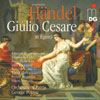Handel Giulio Cesare in Egitto
Some thrilling singing backed by a lively continuo group makes for a cracking disc
View record and artist detailsRecord and Artist Details
Composer or Director: George Frideric Handel
Genre:
Opera
Label: Scene
Magazine Review Date: 8/2010
Media Format: CD or Download
Media Runtime: 0
Mastering:
Stereo
Catalogue Number: MDG6091604

Tracks:
| Composition | Artist Credit |
|---|---|
| Giulio Cesare, 'Julius Caesar' |
George Frideric Handel, Composer
Emanuela Galli, Cleopatra, Soprano George Frideric Handel, Composer George Petrou, Conductor Kristina Hammarström, Giulio Cesare, Alto Mary-Ellen Nesi, Sesto, Soprano Orchestra of Patras Romina Basso, Tolomeo, Alto |
Author: Richard Wigmore
This new recording of Handel’s complete 1724 text, studio-made but based on a stage production in Thessaloniki, comfortably holds its own with the two fine versions from René Jacobs and Marc Minkowski (the latter unaccountably shorn of Cleopatra’s lilting aria “Tu la mia stella sei”). George Petrou, rightly praised for his recordings of Arianna and Tamerlano, directs his alert period band with style and sensibility. His tempo choices are occasionally extreme – languorously protracted in Cornelia’s lament “Priva son d’ogni conforto”, frenetically driven in Caesar’s “Quel’ torrente”. Several times, especially in the first act, I wanted the extended secco recitatives (in Handel’s day a cue for chatter, cards or amorous dalliance) to move more fluently. But despite minor quibbles, the performance, animated by a colourful continuo battalion (two harpsichords, plus strumming theorbo), equals Minkowski, and surpasses Jacobs, in theatrical verve.
Giulio Cesare is in essence a celebration of the power of sex, embodied in the infinitely alluring figure of Cleopatra. Barbara Schlick, for Jacobs, was bright and nimble, but distinctly virginal, while Magdalena KoΩená, for Minkowski, combined sensuality with a certain regal detachment. Emanuela Galli certainly generates a stronger sexual charge than either. She sings her playful numbers in the first act with knowing, coquettish grace, then finds warmer, more voluptuous colourings for the ravishing “Parnassus” tableau, “V’adoro pupille”. After Cleopatra has herself succumbed to the passion she aroused in Caesar, Galli brings a tragic intensity and individuality of nuance to “Se pietà” and “Piangerò”. Occasionally, though, her taste in ornamentation seems questionable, above all in the neurasthenic sighs and swoons in the da capo of “Piangerò” – more Verdi’s Violetta than Handel’s Cleopatra.
Dubiously extravagant da capo embellishments also mar one or two other arias, most spectacularly Caesar’s amorous-pastoral “Se in fiori”, where voice and solo violin contrive to produce a Donizettian mad scene avant la lettre. Still, with the partial exception of Irini Karaianni’s dignified but rather matt-toned Cornelia (far less affecting than Jacobs’s Bernarda Fink), the singers, all round, compare well with their counterparts on the rival recordings. Swedish mezzo Kristina Hammarström – a new name to me – has both the swashbuckling vigour for Caesar’s heroic arias and the intense inwardness for his great, Shakespearean soliloquy at Pompey’s tomb. Though inclined to go berserk in da capos, Romina Basso’s androgynous contralto makes a superb Tolomeo: sleazy, insinuating, neurotically unstable, yet without the hint of camp petulance that countertenors in the role seem unable to avoid. She uses her words more vividly than any of the other singers bar Mary-Ellen Nesi, whose Sextus – fiery, headstrong and thrillingly sung – is surely the finest on disc. Sextus’s magnificent “vengeance” aria “L’angue offeso” is a highlight of the whole performance. The incisive-toned Tassis Christoyannis, moving as the Emperor Bajazet in Tamerlano, makes a high-testosterone, impulsive Achilla.
Those da capo extravaganzas, especially in “Piangerò”, still grate. But I suspect I shall return to this Giulio Cesare at least as often as the rival versions, for much superb Handel singing, for the lively and inventive continuo playing, and for a dramatic flair and immediacy that, at its best, eclipses all-comers.
Discover the world's largest classical music catalogue with Presto Music.

Gramophone Digital Club
- Digital Edition
- Digital Archive
- Reviews Database
- Full website access
From £8.75 / month
Subscribe
Gramophone Full Club
- Print Edition
- Digital Edition
- Digital Archive
- Reviews Database
- Full website access
From £11.00 / month
Subscribe
If you are a library, university or other organisation that would be interested in an institutional subscription to Gramophone please click here for further information.




